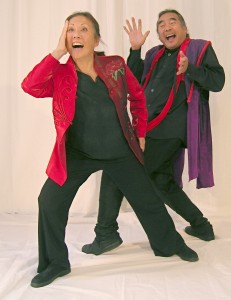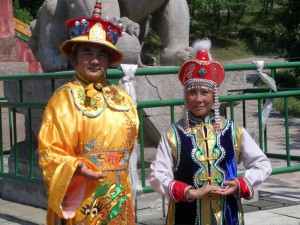
Nancy Wang and Robert Kikuchi-Yngojo create theater of storytelling at the Senior Center this Saturday
The Journey to Orcas
Robert Kikuchi-Yngojo and Nancy Wang of Eth-Noh-Tec will bring together the journey stories of four Orcas Islanders this Saturday, Aug. 7 at the Senior Center, from 3 to 5 p.m.
“Journeys That Shape Our Lives” will relate not only the journeys of travel and location, but the journeys of the heart and profession that brought the four performers to home on Orcas Island.
Robert and Nancy have organized the event in part as thanks for the “miracle story” of their lives with the Orcas community. When first invited by the Orcas Center to perform, they thought the San Juan Islands were in the Caribbean. But once here, “the sense of community touched us deeply, as well as the concern for the environment and te natural beauty.”
They felt that they could be the conduit between urban and rural communities, reaching out to many cultures. As third-and fifth-generation Americans, raised in white communities, Robert and Nancy say they have been able to be very comfortable in the “twin worlds” of white and non-white ethnic communities.
They are the Artistic Co-Directors of Eth-Noh-Tec, and have trained and performed in traditional and contemporary art forms for over two decades, truly meeting the goals of their name Eth-Noh-Tec: The weaving [tec] together of distinctive cultural elements of the East and West [eth] to create new possibilities [noh].
The storytelling event is part of the collaboration of the Orcas Island Historical Society and the Smithsonian Institute’s Journey Stories.
Nancy, whose ancestors came to America in 1850, will tell the story “Bittersweet,” about her mother’s experience through looking at her family’s involvement in the fishing industry, and the anti-Chinese violence that continued through to her mother’s generation. “And, like a healing story, a happy ending, I discover how amazing my mom was, and the noble sacrifice her life was, so that I could be who I am today.”
Robert Kikuchi-Yngojo will tell the magical story “Butterfly” – the story of his mother’s immigration from the Philippines to San Francisco when she was five years old. He will also sing songs he wrote of cultural identity and the journey of self-awareness through the Asian American experience.
Ginni Stern, who lives on Orcas and works at Earthglobes, has been a Holocaust Educator, Hospice Trainer and Psychotherapist. She is the daughter of a Jewish Holocaust Survivor and has been active in Dialogue Groups that bring together descendants of the Holocaust and the Third Reich in Jewish/German Dialogue, since 1995.
Ginni has helped coordinate and facilitate the Zen Peacemakers “Bearing Witness” Retreat at the World War II Auschwitz concentration camp. The purpose of the retreat each November is to bring healing to the participants and a sense of peace and love to the souls of those who died there, Ginni says. Because she has no family gravestones upon which to place a stone in the USA, she has returned to Auschwitz each year since 1996 to place a stone into the Ash Pit at Birkenau.
The Bearing Witness retreat enacts the three tenents of the Zen Peacemakers: to bear witness to whatever is taking place within us and right before our eyes; to let go of fixed ideas; and to heal ourselves and others.
Stern calls Auschwitz “a universal repository for great pain.” She will relate how her “sojourns to Auschwitz have taught me about the limits of compassion and the malleable boundaries of our humanity.”
Anji Ringzin, (who with her husband owns a small business in Eastsound making tools for personal exploration) will recite the work of the poet Jalal Al-Din Rumi, born in 1207. Rumi fled from Mongol-ridden Afghanistan to come to Turkey, where he lived and taught until his death in 1273. Rumi’s words offer an all-encompassing spirituality relevant to our times: being present in the moment, finding the holiness in laughter and grief. The general theme of Rumi’s thought is essentially that of the concept of oneness– or union with the beloved.
Rumi said, ‘The eye is meant to see things; the soul is here for its own joy.’ ”
The public is invited to come hear these storytellers for an exceptional two hours of “Journeys that Shape our Lives” Saturday, August 7th, from 3 to 5 p.m. at the Senior Center on Henry Road in Eastsound. A reception will follow the storytelling performance.
(” Destination: Orcas Island” passport bearers will receive another stamp, entitling them to enter the Special Journey Drawing on August 30. The winner will receive two round-trip airfares between Eastsound and Seattle, courtesy of Kenmore Air.)
Journey with Eth-Noh-Tec to China
Nancy and Robert would like to welcome Orcas Islanders with similar tales to tell to accompany them on their fourth community-building trip to the storytelling village of Gengcun, China this fall.
In China, Robert says, “We share the best of who we are with a village that honors their tradition of over 600 years of storytelling.”
The trip, from Sept 12 to 26, will include sightseeing to the “grand usual” tourist stops – the Great Wall, the Forbidden City, but the highlight will be the ancient village of Gengcun, where storytelling is an honored tradition.
Robert describes how over thousands of years, travelers on trade routes have shared stories for entertainment at the way stations where they stop for the night. And, like a reservoir that remains as trade and dynasties change, the village of Gengcun has kept its storytelling traditions alive.
The village – a three-hour bus trip from Beijing – relies on farming, shepherding and a brick factor. Like many small towns, it has seen its youth leave for good jobs in the city, and age-old traditions suffer.
Recordings and storytelling sessions with young people keep the stories alive, and the international interest their town has garnered for its storytelling has increased their awareness that traditional arts are important and convey prestige. The village elders get a stipend as “National Treasures” from the government, and Gengcun is recognized as a traditional storytelling village.
Still, “We suspect they may not realize how voracious modern culture is,” says Robert. Eth-Noh-Tec hopes to revive a storytelling venue in Gengcun, perhaps in a teahouse, or a tavern or a temple. Eth-Noh-Tec also is trying to get the United Nations’ cultural arm, UNESCO, involved, which fits in with the service they provide the village on each of the three trips they have made previously to Gengcun. They improved the local water supply to homes, obtained books for a library from a publishing house, and donated funds to provide school supplies and to build roads.
In the village, the travelers will “Swap Stories” as they visit different clusters of storytellers. There will also be presentations in the Hall of Stories with music, song, and dance presented by the villagers; and opportunities to share performances in more casual settings.
Eth-Noh-Tec will help the participants fashion their stories for the tour. “Everybody’s a storyteller,” says Nancy, “from the Three Little Pigs to folktales to an ancient story from history. Short and sweet works very well, with a 5-minute tale stretching to 10 minutes with translation.
“And story lovers are also welcome,” says Nancy. One former participant brought a photo album of his family farm that was met with great enthusiasm by the Gengcun villagers.
The optimal number of participants on the trip is 24; although their last trip in 2006, they brought along 45 participants. The cost is $2,600, or $3,000 for single-room supplement in the hotel in a nearby city. Because they hope to draw artists, they have kept the price low for the two-week trip, knowing artists generally have limited funds available.
As well as the tourist highlights and the village immersion, just the street life of China, whose culture fully embraces community, rather than the “rugged individualism” of the American experience, will fully involve the tour participants. From the produce and meat markets in the street just outside the hotel in the nearby city, Robert and Nancy will guide visitors to off-the-tourist-track places. One such place is a huge Exercise Park where, in addition to making use of permanent metal exercise equipment, people crack bullwhips, play musical instruments, perform gymnastics and contortions among other physical activities.
The number of Chinese who interact with each other is amazing, says Robert. He describes rising at 5:30 a.m. to find the streets already alive with people dancing or practicing Tai Chih or Kung Fu. “From the American point of view, it’s incredible how much people in China think in terms of community,” says Robert.
The family was always important, and now, since one child is the law of the land, that sense of community is more “horizontal than vertical,” explains Nancy.
“This will be our fourth tour, and people have told us previous trips have completely changed their lives,” say Robert and Nancy. “They get to be with people, not just look at tour sites. They stay with a community that has lived together forever. We U.S. people have all the toys, and we go to a village with cinderblock homes — one room with just a teapot and a chair and a bed — and consider, ‘What does it take to have happiness and well-being?’
“These people have lived simply for 1,000 years, and whether communist or capitalist, we realize there’s no difference between human beings. We really have to pay attention to what both our governments are telling us.”
Expectations of the stereotypical Chinese — cold, reserved, aloof — “get busted right away when you get off the bus and are greeted by smiling old ladies all dressed in red, drumming, holding babies and welcoming you, and old farmers shaking your hand and patting you on the back,” Robert says.
Combining words, dance, music and theater, the storytelling performance at the end of the trip celebrates the world-wide sense of community expressed through the “immediate give and take with the audience of storytelling.”
For more information about the trip, go to www.ethnohtec.org and click on “China Journey” or call 415-282-8705; or email contact@ethnohtec.org
**If you are reading theOrcasonian for free, thank your fellow islanders. If you would like to support theOrcasonian CLICK HERE to set your modestly-priced, voluntary subscription. Otherwise, no worries; we’re happy to share with you.**








